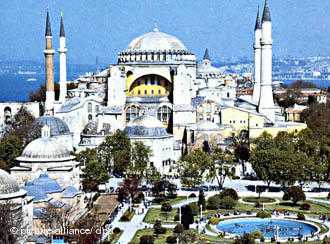Corruption allegations in US diplomatic cables released by Wikileaks have generated some hot rhetoric from Turkey’s leaders. But with no genuine bombshell contained in dispatches released so far, it may simply be business as usual in Turkish politics.
Prime Minister Recep Tayyip Erdogan, speaking at a municipal ceremony in Ankara on December 1, vowed to file a lawsuit connected with an allegation contained in one US cable in 2004. The cable asserted that he had opened eight Swiss bank accounts.
“We have discussed these issues with the US administration,” Erdogan said. “They have extended their apologies, but it’s not enough. They have to take all necessary measures against these diplomats.”
It remains to be seen whether Erdogan follows through on his threat to sue for what he claims is slander. But his harsh stance is an indication of how — with a general election only six months away — corruption claims, character snipes, policy condemnations, and plain insults contained in the leaked dispatches may feed into Turkey’s fractious domestic politics in ways that could damage relations with Washington.
According to Henri Barkey of the Carnegie Endowment for Peace, Erdogan’s harsh statement was likely intended to preempt any damage the cables might cause. “The United States is very unpopular in Turkey and it is unlikely that assertions in US cables will have much resonance,” he told Eurasianet.org. “But Erdogan has to go on the offensive, he has no choice in order to contain it just in case. The best defense is offense obviously.”
The secret bank accounts claim is not the only potentially damaging allegation made in the 30 or so Turkey-related cables brought to light by WikiLeaks so far. Other claims — all denied by those involved — include an allegation that Defense Minister Vecdi Gonul described current Foreign Minister Ahmet Davutoglu as ‘exceptionally dangerous’ in a secret conservation with US ambassador Eric Edelman in 2004; Finance Minister Mehmet Simsek allegedly urged foreign investors to sell stock in Turkey’s Dogan Media Group, just as the government became embroiled in a tax battle with the corporation; and MKEK, Turkey’s state run arms manufacturer, may have been negotiating a weapons deal with Iran that would violate UN sanctions, as alleged in a cable signed off by US Secretary of State Hillary Clinton in February this year.
Analysts in Istanbul and Ankara believe it is too soon to predict what impact, if any, the allegations in the cables will have on Turkish domestic politics, which is so polarized that opinions are hard to shift even in the face of the most dramatic revelations. “The ones that have come out so far aren’t enough to turn the tables in Turkey,” Cengiz Candar, a columnist for the daily Radikal, told Eurasianet.org.
In laying bare the hidden tensions and mistrust between Washington and Ankara, the Wikileaks cables may even benefit the AKP by revealing its independence from the United States. “If they show the AKP is not a puppet of America, they will help the AKP,” Hurriyet Daily News columnist Yusuf Kanli told Eurasianet.org. “In terms of anti-Americanism, they will try to play it down in their foreign policy approaches, but domestically they will play it up of course.”
The cables may have more serious implications in that they reveal Turkey’s isolated stance towards Iran. In one dispatch from 2009, Davutoglu offered a spirited defense of Ankara’s foreign policy in the Middle East to senior US diplomat Philip Gordon, claiming it offered a ‘third way’ to that of Iran and Saudi Arabia, meaning that it could ‘limit Iranian influence in the region.’ But other cables revealed the private alarm of most Middle Eastern governments at the prospect of a nuclear Iran.
“We will see how these leaked documents will influence the government’s Middle East policies,” commented Semih Idiz in the daily Milliyet newspaper. “But we do now plainly see that Turkey is isolated not only in the West when it comes to the subjects of Iran, Hamas and Hezbollah, but also amongst Middle Eastern regimes. It does not seem very realistic to go on as before and to pretend that nothing has happened.”
With only a fraction of the nearly 8,000 leaked cables to date originating from Turkey in the public domain, it is always possible that more damaging revelations may turn up. As it is, the Islamic-oriented press in Turkey has lots of fodder. In cables that have already surfaced, Edelman, the neo-conservative former American ambassador, has described Islam in Turkey as “stultified, riddled with hypocrisy, ignorant, and intolerant of other religions’ presence in Turkey.”
James Jeffrey — a more incisive and sympathetic US envoy – adopted a more nuanced tone in a dispatch on Turkey’s perceived drift away from the American sphere: “Does all this mean that the country is becoming more focused on the Islamist world and its Muslim tradition in its foreign policy? Absolutely. Does it mean that it is ‘abandoning’ or wants to abandon its traditional Western orientation and willingness to cooperate with us? Absolutely not.”
“At the end of the day we will have to live with a Turkey whose population is propelling much of what we see,” he wrote. “This calls for a more issue-by-issue approach, and recognition that Turkey will often go its own way.”
Editor’s note: Alexander Christie-Miller is a freelance journalist based in Istanbul, where he writes for the Times.
via Turkey: Will WikiLeaks Cables Upset Status Quo in Ankara? | EurasiaNet.org.
